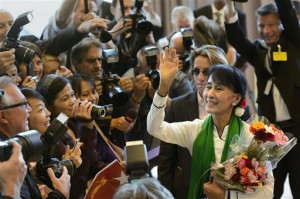Suu Kyi urges care as world reaches out to Myanmar

Aung San Suu Kyi, the Myanmar opposition leader, waves as she arrives at the 101st International Labor Organization Conference at the European headquarters of the United Nations in Geneva, Switzerland, Thursday, June 14, 2012. Suu Kyi will visit Switzerland, Norway, Ireland, Britain and France from June 13 to June 29. AP PHOTO/KEYSTONE, MARTIAL TREZZINI
GENEVA—Foreign investment must help—not hurt—Myanmar’s goal of moving toward full democracy, opposition leader Aung San Suu Kyi said Thursday as she welcomed efforts to reach out to her country while it emerges from decades of isolation under military rule.
The Nobel Peace laureate is on her first trip to Europe in 24 years and her comments abroad are being closely watched by foreign governments and businesses eager to invest in Myanmar, as well as by the country’s own reformist rulers wary of her status as political superstar.
Speaking calmly to a hall full of UN diplomats brimming with excitement at her presence, Suu Kyi delivered a thoughtful message on workers’ rights and investors’ responsibilities.
“I would like to call for aid and investment that will strengthen the democratization process,” she told the annual meeting of the International Labor Organization in Geneva, which has long supported her cause. “We accept that investments must pay off,” she added. “But we would like these profits to be shared between the investors and our people.”
Suu Kyi highlighted the secrecy surrounding recent deals between China and the Myanmar Oil and Gas Enterprise. The state-owned company that all foreign firms seeking to tap into the country’s oil and gas riches must deal with “lacks both transparency and accountability at present,” she said.
Article continues after this advertisementWestern companies, too, have been eager to invest in the Southeast Asian nation as the sanctions it faced under military rule are gradually lifted.
Article continues after this advertisement“Any new investment that comes in because of the lifting or suspension of sanctions should add to the democratic process rather than subtract from it,” Suu Kyi told reporters after the speech.
Many years as an international pariah have left Myanmar, also known as Burma, poor and in need of foreign investment, but concerns remain about corruption and money being used to prop up the powerful military.
Suu Kyi’s two-week visit to Europe next takes her to the Swiss capital Bern for a meeting with the government. On Friday, she flies to Oslo, where she will make a belated acceptance speech Saturday for the Nobel Peace Prize that was awarded to her in 1991. At the time, she was detained by the military after leading a pro-democracy party to victory in Myanmar’s 1990 election.
Also on her itinerary are France, Ireland and Britain, where she will speak to both houses of parliament and receive an honorary doctor from Oxford.
Though willing to chide her government, Suu Kiy was cautious when asked about the sensitive issue of Myanmar’s western Rakhine state, where violent clashes have occurred recently between the Bhuddhist population and the Muslim Rohingya ethnic group.
Suu Kyi refused to say outright whether the Rohingya should have Myanmar citizenship, instead saying the issue should be decided by “the rule of law.”
Her National League for Democracy remains outside of the government but has endorsed the reforms instituted by Myanmar President Thein Sein, who is backed by the still-powerful military.
Suu Kyi hinted that her political ambitions may not stop at a supporting role in the new Myanmar.
“I do not stand here as a representative of the workers, or of employers, or of government,” she told the ILO meeting. “Not yet anyway.”
Asked later by The Associated Press whether she could forgive the junta for ignoring the outcome of the 1990 elections and keeping her under house arrest for 15 of the next 22 years, the woman who is seen as an icon of the democracy movement took the high road.
“In some ways I don’t think they really did anything to me,” she said.
“Well, they placed me under house arrest, but that gave me a lot of time to read,” she added, wistfully. “I do not think I have anything to forgive them for.”